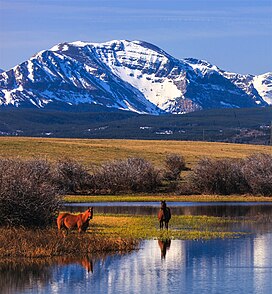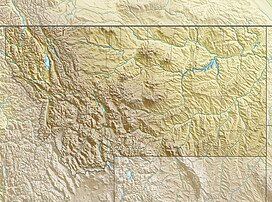Sentinel Mountain is an 8,245-foot-elevation (2,513 meter) summit in Glacier County, Montana, United States.[4]
| Sentinel Mountain | |
|---|---|
 Northeast aspect | |
| Highest point | |
| Elevation | 8,245 ft (2,513 m)[1][2] |
| Prominence | 583 ft (178 m)[2] |
| Parent peak | Bear Mountain (8,841 ft)[3] |
| Isolation | 1.72 mi (2.77 km)[3] |
| Coordinates | 48°58′45″N 113°44′46″W / 48.9790303°N 113.7460397°W[4] |
| Geography | |
| Location | Glacier National Park Glacier County, Montana, US |
| Parent range | Lewis Range Rocky Mountains |
| Topo map | USGS Gable Mountain |
Description
editSentinel Mountain is located 1.3 miles (2.1 km) south of the Canada–United States border in the Belly River area of Glacier National Park. It is situated in the Lewis Range, seven miles northwest of landmark Chief Mountain, and approximately 15 miles east of the Continental Divide. Precipitation runoff from the mountain drains into tributaries of the Belly River. Topographic relief is significant as the summit rises nearly 2,900 feet (880 meters) above the North Fork Belly River in one mile. The mountain's toponym was officially adopted in 1929 by the United States Board on Geographic Names.[4]
Geology
editLike other mountains in Glacier National Park, Sentinel Mountain is composed of sedimentary rock laid down during the Precambrian to Jurassic periods. Formed in shallow seas, this sedimentary rock was initially uplifted beginning 170 million years ago when the Lewis Overthrust fault pushed an enormous slab of precambrian rocks 3 mi (4.8 km) thick, 50 miles (80 km) wide and 160 miles (260 km) long over younger rock of the cretaceous period.[5]
Climate
editAccording to the Köppen climate classification system, Sentinel Mountain is located in an alpine subarctic climate zone with long, cold, snowy winters, and cool to warm summers.[6] Winter temperatures can drop below −10 °F with wind chill factors below −30 °F. Due to its altitude, it receives precipitation all year, as snow in winter, and as thunderstorms in summer.
See also
editReferences
edit- ^ Bill Yenne (2006), Glacier National Park, Arcadia Pub., ISBN 9780738530116, p. 126
- ^ a b "Sentinel Mountain, Montana". Peakbagger.com. Retrieved December 17, 2022.
- ^ a b "Sentinel Mountain – 8,245' MT". listsofjohn.com. Retrieved December 17, 2022.
- ^ a b c "Sentinel Mountain". Geographic Names Information System. United States Geological Survey, United States Department of the Interior. Retrieved December 17, 2022.
- ^ Gadd, Ben (2008). Geology of the Rocky Mountains and Columbias.
- ^ Peel, M. C.; Finlayson, B. L.; McMahon, T. A. (2007). "Updated world map of the Köppen−Geiger climate classification". Hydrol. Earth Syst. Sci. 11 (5): 1633. Bibcode:2007HESS...11.1633P. doi:10.5194/hess-11-1633-2007. ISSN 1027-5606. S2CID 9654551.
External links
edit- Weather forecast: Sentinel Mountain

